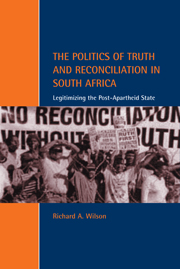Book contents
- Frontmatter
- Contents
- List of Acronyms and Glossary
- Maps
- Preface and Acknowledgements
- 1 Human Rights and Nation-Building
- PART I Human Rights and Truth
- PART II Reconciliation, Retribution and Revenge
- 4 Reconciliation Through Truth?
- 5 Reconciliation in Society: Religious Values and Procedural Pragmatism
- 6 Vengeance, Revenge and Retribution
- 7 Reconciliation with a Vengeance
- 8 Conclusions: Human Rights, Reconciliation and Retribution
- Notes
- Bibliography
- Index
5 - Reconciliation in Society: Religious Values and Procedural Pragmatism
Published online by Cambridge University Press: 10 November 2009
- Frontmatter
- Contents
- List of Acronyms and Glossary
- Maps
- Preface and Acknowledgements
- 1 Human Rights and Nation-Building
- PART I Human Rights and Truth
- PART II Reconciliation, Retribution and Revenge
- 4 Reconciliation Through Truth?
- 5 Reconciliation in Society: Religious Values and Procedural Pragmatism
- 6 Vengeance, Revenge and Retribution
- 7 Reconciliation with a Vengeance
- 8 Conclusions: Human Rights, Reconciliation and Retribution
- Notes
- Bibliography
- Index
Summary
LEGAL PLURALISM AND HUMAN RIGHTS IN SOUTH AFRICA
The next three chapters evaluate how the religious-redemptive model of reconciliation was received by its intended audience in African townships. Based in ethnographic methods and extensive interviews in the Johannesburg area, they attempt to answer the questions: How does human rights talk interact with everyday moralities and understandings of justice? Do national leaders' calls for reconciliation have any purchase in areas traumatized by political violence? By examining these issues in particular locales, we can get a sense of how successful post-apartheid regimes have been in inculcating a ‘culture of human rights’.
Over the past fifteen years, there has been a lively dialogue between anthropologists and colonial historians regarding the relationship between state law and informal morality and justice. A key and contested notion in this debate has been ‘legal pluralism’; this is a descriptive term and analytical concept which attempts to address the existence of more than one legal system in a single political unit. In general, anthropologists have found the term useful, whereas historians of colonialism have objected to it. These three chapters ask whether the idea of legal pluralism is valuable for thinking about legal consciousness in the unique historical phase of the dismantling of apartheid.
Legal pluralism originated in anti-positivist legal philosophy in the early twentieth century as a reaction to an exclusionary state centralism which regarded only state law as law.
- Type
- Chapter
- Information
- The Politics of Truth and Reconciliation in South AfricaLegitimizing the Post-Apartheid State, pp. 123 - 155Publisher: Cambridge University PressPrint publication year: 2001

